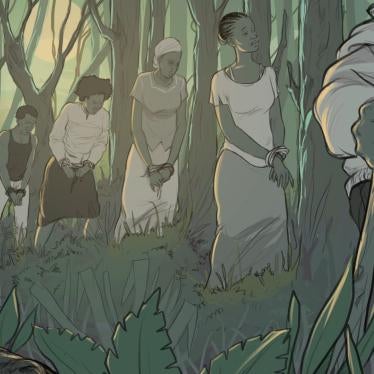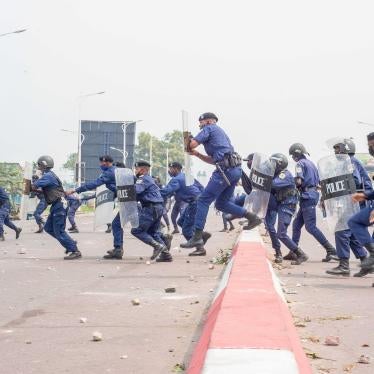On June 17, the Canadian Partnership for International Justice submitted a letter to the prosecutor of the International Criminal Court (ICC) urging her to investigate the former Congolese president, Joseph Kabila, and senior officials from his government for atrocities in the Democratic Republic of Congo. This letter is a reminder that the work of the ICC in Congo is far from over. A look back at the court’s promises, achievements, and missteps in Congo reveals that the ICC should do more to bring cases addressing the accountability of senior officials for the gravest crimes and to provide increased support for domestic investigations and prosecutions.
The ICC opened its first investigation in Congo in 2004, following a referral by the Congolese government. The prosecutor’s investigations have since focused on alleged war crimes and crimes against humanity in eastern Congo, Ituri as well as North and South Kivu, since July 1, 2002. The ICC’s Office of the Prosecutor (OTP) has publicly brought cases against six individuals, all former rebel leaders. Some of these cases resulted in important achievements, including the historic conviction of Bosco Ntaganda in 2019 for 18 counts of war crimes and crimes against humanity. At the same time, the court developed innovative initiatives for outreach.
The Congo investigations led to the first cases to reach the court. These faced significant challenges and were marked by controversies that highlighted gaps in the court’s practices and investigative strategies. In addition, although the number of Congo cases is among the highest for any situation before the ICC, the choice of cases has fallen short of expectations.
Of course, with the ICC’s role as a court of last resort, it was never envisioned that it would take on all cases of serious crimes in Congo since 2002. However, as we have contended based on our observations of court practice across situations, if the ICC is to deliver meaningful justice and maximize impact, the cases the prosecutor selects should seek to impartially establish individual criminal responsibility at senior leadership levels and include incidents representative of the gravest crimes. This is necessary to ensure that the court’s work resonates with affected communities and addresses legitimate expectations for justice. The Congo cases brought before the ICC have not met these criteria.
For example, the OTP’s investigation in the Kivus appears to have focused solely on the rebel group Democratic Forces for the Liberation of Rwanda (Forces démocratiques de libération du Rwanda, FDLR). Cases brought against two leaders of the FDLR did not reach trial—in one, the group’s military commander was killed without facing arrest and in the other, there was insufficient evidence to confirm charges against the group’s executive secretary. The omission of cases against other actors allegedly involved in serious crimes in North and South Kivu is striking given the scale and widespread nature of the mass atrocities documented there.
In addition, the Congo cases brought before the ICC have failed to address accountability by senior political and military officials. With Ntaganda, who had risen to the rank of general in the Congolese army and was shielded from arrest and prosecution for many years, the court did prosecute a high-level suspect considered untouchable until he defected to form a new rebel group and eventually surrendered in 2013. But his trial only covered crimes committed when he was a rebel leader in Ituri and did not include charges for atrocities allegedly committed by forces under his command in the Kivus, including the Congolese army. The ICC has brought no charges against the military and political leaders who allegedly supported abusive armed groups in eastern Congo over the last two decades.
These are not gaps that domestic authorities are likely to fill any time soon, despite important developments in the investigation and prosecution of serious crimes in Congo. Over the past 15 years, Congolese military courts have taken on an increasing number of cases involving war crimes and crimes against humanity. Still, the vast majority of atrocities committed in Congo remain unpunished and domestic proceedings continue to reveal flaws in the national judicial system. Notably, these cases are being tried almost exclusively in military courts, raising serious concerns about lack of independence and impartiality to prosecute senior military officials, as well as fair trial issues, particularly given the absence of an appeal mechanism for certain military courts.
In this context, the OTP could play a more robust and strategic role in supporting domestic efforts toward accountability. The court is not a development agency, but ICC officials can share expertise and catalyze capacity-building assistance and other needed initiatives by other international partners. The OTP’s indication that it plans to strengthen its efforts in this regard is positive. In a recent statement on the escalation of violence in Ituri, the prosecutor stated that her office:
will intensify its contact with the Congolese authorities to reinforce the work already initiated so as to map the incidents which are potentially within the ICC’s jurisdiction, and to exchange experience and information with the authorities on the urgent steps which need to be taken, particularly in connection with the processing of priority cases by the Congolese justice system.
To maximize the ICC’s contribution to justice in Congo, cases tried before the court need to go hand-in-hand with dialogue and investment at the national level. But given the significant obstacles to investigating and prosecuting certain kinds of cases in domestic courts, the OTP still has work of its own to ensure that the ICC’s legacy will be meaningful and credible justice.
What the OTP needs now is a clear vision that sets out concrete plans to advance its own work, while strengthening its role in supporting domestic efforts, together with other court actors and international partners. The office’s commitment to develop “completion strategies” in its most recent strategic plan may provide the right vehicle to do so. This needs to include ICC cases that go beyond rebel leaders. The prosecutor should consider cases involving senior Congolese army commanders allegedly responsible for grave crimes who continue to evade justice because they evidently have protection at the domestic level.
The prosecutor should also investigate the role of senior political and military officials from Congo, Rwanda, and Uganda who have supported, armed, and financed abusive armed groups in eastern Congo over the years. Civil society organizations, United Nations experts, and others have extensively reported on the regional dimension of the conflicts in Ituri and the Kivus. For example, Human Rights Watch documented the role of Rwanda in supporting the March 23 Movement (Mouvement du 23 mars, M23) in North Kivu as well as the role of both Uganda and Rwanda in backing rebel groups in Ituri.
Each new cycle of violence highlights the need to address pervasive impunity in Congo, and despite its challenges, the ICC remains a key actor. A strategy to advance its own work while supporting domestic authorities will be far from easy to achieve. The court is under pressure to prioritize, not expand, its work in each situation, as it deals with limited financial support and a ballooning docket. But unless more is done, the ICC’s contribution to justice in Congo risks depriving victims of meaningful accountability.
For their part, ICC member countries should support the work of the court by allocating sufficient resources. They also need to return to meaningful discussions of how they can support credible domestic justice together with the Congolese authorities through political dialogue and capacity building.
Sixteen years after the opening of the court’s first investigation in Congo, the ICC should consider its legacy in the country. Its capacity to deliver meaningful justice and to assist domestic institutions in taking up their responsibilities will define it.








